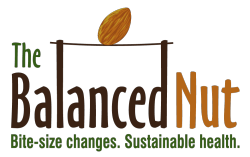Spirituality
What do spiritual book recommendations have to do with health? My answer: A lot.
Eating your body weight in organic kale is noble, but food will never be enough to heal you if you are unable to mentally cope with the stress of your obligations and the fallout from some of the bad sh*t that will undoubtedly go down if you live on this planet. Spirituality is directly linked to our mental health. Some people find it at the end of a fishing rod, others find it in a yoga pose. Some find it rock climbing, others find it in religion. Spirituality can wear many disguises, but on the inside it’s always the same. It’s a place we can go to be quiet and figure out what is true for each of us. It’s the way we stabilize ourselves when life shoves us off balance. It asks us to think about who we are individuals, and who we are in relation to each other. It helps us understand, or at least, to carry on, when life’s toughest questions feel unanswerable.
The Power of Now, by Eckhart Tolle
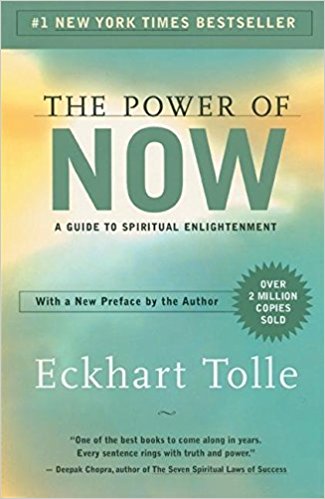 One night, on the verge of suicide, Tolle, roiling in the grips of depression, had a sudden mental shift. He realized that there were two of him, the he who was experiencing suffering, and the he who was observing it (i.e. the commentator commenting that he no longer wished to live with it). The deep understanding of this tiny distinction sparked a sudden spiritual awakening in him and years of unrelenting anguish immediately dissolved. From that point on, Tolle realized how powerful the act of separating the observing-self from the experiencing-self was. He discovered how time is just a series of present moments, and how we create our own suffering by resisting what is. If you find yourself obsessing about the past or the future (eg. “I should have”…”If only I would have”…”Next time I’m going to…”) or if you struggle with recurring bouts of sadness or depression, The Power of Now might be a helpful tool that teaches how to free yourself from pain by simply observing your own experiences without judgement. If you enjoy this book, you might also enjoy Tolle's other book, A New Earth.
One night, on the verge of suicide, Tolle, roiling in the grips of depression, had a sudden mental shift. He realized that there were two of him, the he who was experiencing suffering, and the he who was observing it (i.e. the commentator commenting that he no longer wished to live with it). The deep understanding of this tiny distinction sparked a sudden spiritual awakening in him and years of unrelenting anguish immediately dissolved. From that point on, Tolle realized how powerful the act of separating the observing-self from the experiencing-self was. He discovered how time is just a series of present moments, and how we create our own suffering by resisting what is. If you find yourself obsessing about the past or the future (eg. “I should have”…”If only I would have”…”Next time I’m going to…”) or if you struggle with recurring bouts of sadness or depression, The Power of Now might be a helpful tool that teaches how to free yourself from pain by simply observing your own experiences without judgement. If you enjoy this book, you might also enjoy Tolle's other book, A New Earth.
The Spontaneous Fulfillment of Desire, by Deepak Chopra
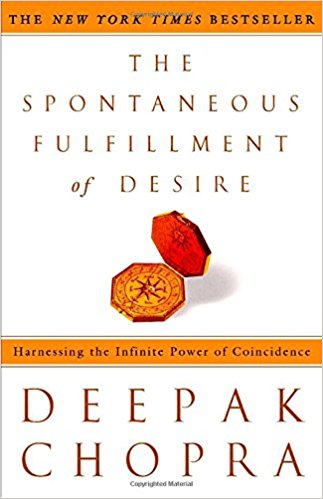 This book was a game changer for me because as a spiritual skeptic I always thought “God” or “The Universe” or whatever you personally call it, was something people believed in because it made them feel better. In this book, Chopra pulled back the curtain for me, explaining theories of quantum mechanics, such as non-locality & the observer effect (and others), in easy-to-understand language that helped me see why it was not only scientifically possible, but scientifically likely, that there is a force in this world that interacts with us, responding to our thoughts, awareness, and intentions. This is a great book for those who want to learn more about how the universe might operate on a quantum/energetic level. It also offers tools for noticing and harnessing synchronicity (when a coincidence feels like more than a random event) and the power of intention.
This book was a game changer for me because as a spiritual skeptic I always thought “God” or “The Universe” or whatever you personally call it, was something people believed in because it made them feel better. In this book, Chopra pulled back the curtain for me, explaining theories of quantum mechanics, such as non-locality & the observer effect (and others), in easy-to-understand language that helped me see why it was not only scientifically possible, but scientifically likely, that there is a force in this world that interacts with us, responding to our thoughts, awareness, and intentions. This is a great book for those who want to learn more about how the universe might operate on a quantum/energetic level. It also offers tools for noticing and harnessing synchronicity (when a coincidence feels like more than a random event) and the power of intention.
The Disappearance of the Universe, by Gary Renard
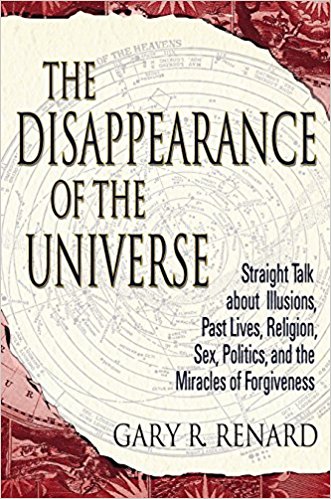 This is one of the most mind-bending books I’ve read, and I’ll start off by recommending it with a strong caveat—certain elements in it can feel very far-fetched, and downright unbelievable. That said, the majority of the book features interesting discussions and summations of A Course in Miracles (ACIM). For those who aren’t familiar, ACIM is a self-study spiritual thought system that differentiates between two basic forces in the universe: Love and Fear. It teaches that by seeing through the illusion of our misperception, we can learn to live from a place of love, forgiveness and compassion (similar in some ways to Buddhism). Another benefit of Disappearance of the Universe is that while ACIM is written in heavy Christian language (although it expresses a non-sectarian, non-denominational spirituality), this book is communicated in everyday language, and is therefore a nice introduction to ACIM core concepts using secular terminology.
This is one of the most mind-bending books I’ve read, and I’ll start off by recommending it with a strong caveat—certain elements in it can feel very far-fetched, and downright unbelievable. That said, the majority of the book features interesting discussions and summations of A Course in Miracles (ACIM). For those who aren’t familiar, ACIM is a self-study spiritual thought system that differentiates between two basic forces in the universe: Love and Fear. It teaches that by seeing through the illusion of our misperception, we can learn to live from a place of love, forgiveness and compassion (similar in some ways to Buddhism). Another benefit of Disappearance of the Universe is that while ACIM is written in heavy Christian language (although it expresses a non-sectarian, non-denominational spirituality), this book is communicated in everyday language, and is therefore a nice introduction to ACIM core concepts using secular terminology.
Outrageous Openness, by Tosha Silver
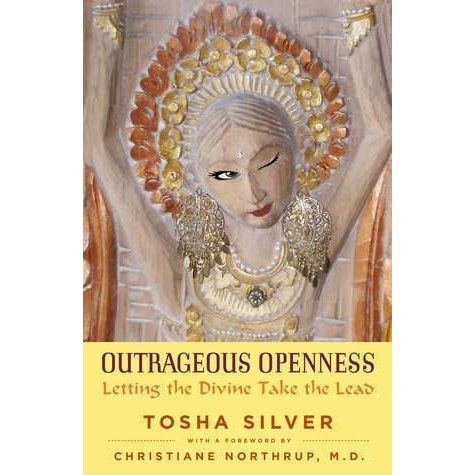 This little book is a delight to read. It’s fun, funny, and doesn’t take itself too seriously, while at the same time lights the way for us to see the openness and possibility that comes when we acknowledge our desires, do what we can to help ourselves, and then surrender the outcome to a higher power—be it God, The Universe, Destiny, or Fate. This book deals in the concept of surrender, reminding us that surrender doesn’t mean giving up, but helping ourselves without creating undue suffering. What is particularly helpful in these pages is the language Silver presents for surrendering. For example, when something you want isn’t happening as fast as you wish, Silver recommends reminding yourself: “My life is unfolding in Divine timing. All delays are beneficial. I’m always at the right place at the right time.” Given that you can’t make it happen any faster, and that you really don’t know what might be best for you (hint: it’s not always what you want), why not relieve your stress and hand it over to someone/something else?
This little book is a delight to read. It’s fun, funny, and doesn’t take itself too seriously, while at the same time lights the way for us to see the openness and possibility that comes when we acknowledge our desires, do what we can to help ourselves, and then surrender the outcome to a higher power—be it God, The Universe, Destiny, or Fate. This book deals in the concept of surrender, reminding us that surrender doesn’t mean giving up, but helping ourselves without creating undue suffering. What is particularly helpful in these pages is the language Silver presents for surrendering. For example, when something you want isn’t happening as fast as you wish, Silver recommends reminding yourself: “My life is unfolding in Divine timing. All delays are beneficial. I’m always at the right place at the right time.” Given that you can’t make it happen any faster, and that you really don’t know what might be best for you (hint: it’s not always what you want), why not relieve your stress and hand it over to someone/something else?
Many Lives Many Masters, by Brian Weiss
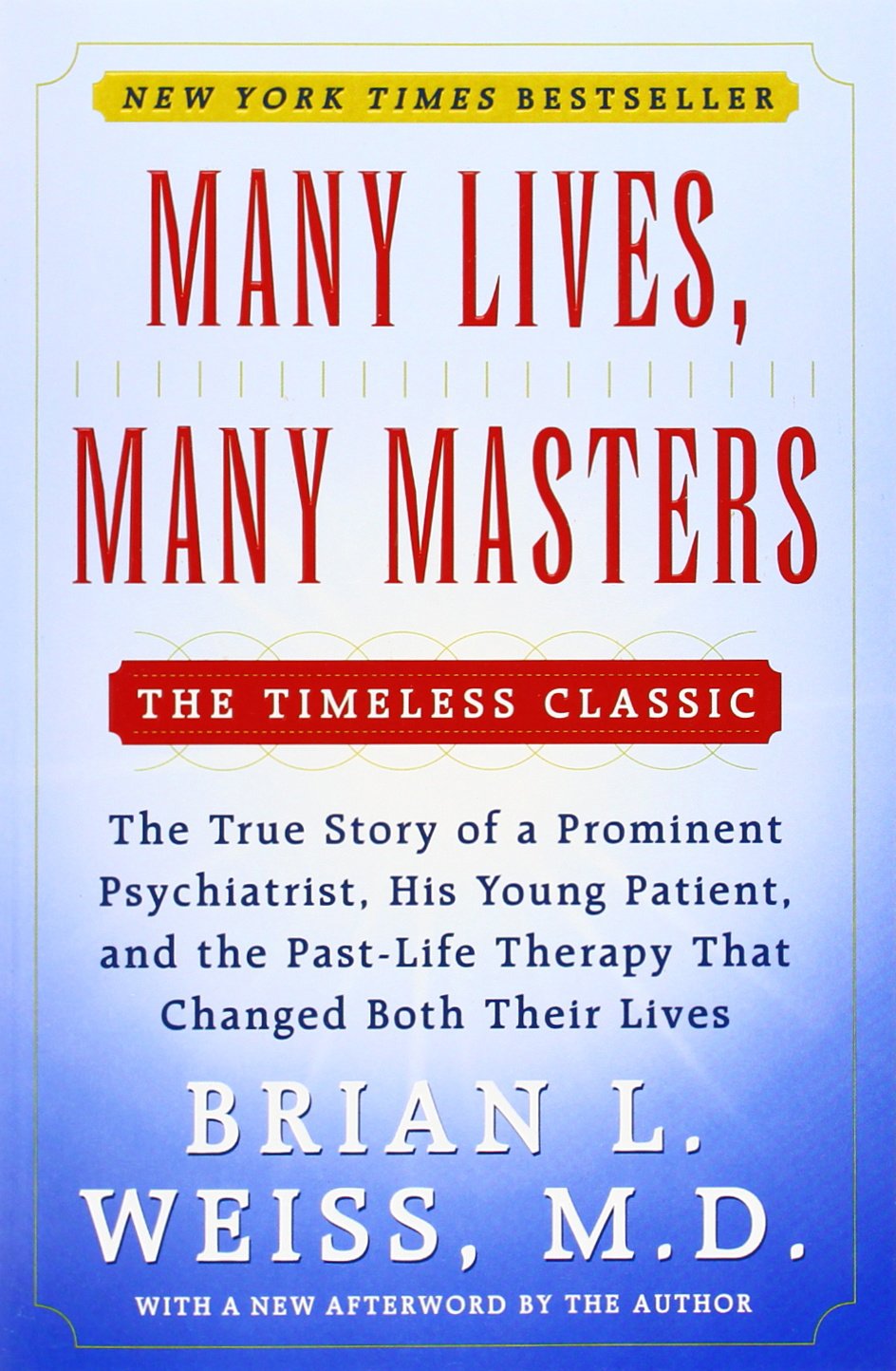
The first time I read Many Lives Many Masters was in 1989, approximately a year after the book was published. Back then I would have called myself an atheist, and this work was the first time I had been willing to open my mind to the possibility of life after death. What sold me was that Dr. Brian Weiss, a traditional psychiatrist educated at Yale and Columbia, had also been a devout skeptic. One day, while hypnotizing a patient to bring her back to a childhood trauma, he accidentally took her back into a past life. In that past-life regression, Dr. Weiss’ patient recalled a particular traumatic event that had taken place in an ancient lifetime, and afterwards, symptoms that had persisted for years finally vanished. Dr. Weiss was astonished and cynical, and hid his findings for years to protect his reputation. However, his patient’s improvement, his own research on some of the historical details she confessed, plus personal unknowable information she provided him about his own current life, finally convinced him to pursue past life regression as a healing modality. If you enjoy this book, I also highly recommend all of Brian Weiss' other books.
The Untethered Soul, by Michael J. Singer
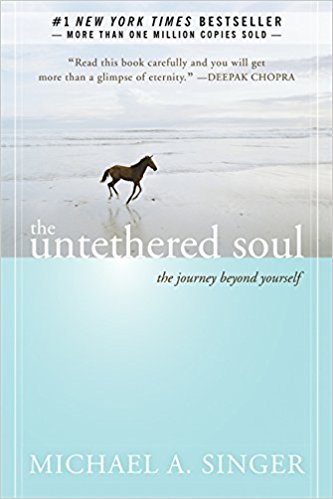 Similar to The Power of Now, The Untethered Soul focuses on helping you understand the difference between the two you's: the real you (the unchanging you/your soul), and the egoic you (that voice in your head who won’t shut up, constantly commenting & judging. Singer calls this voice the annoying roommate). By learning to view your thoughts as separate from who you truly are, you begin to release fear, let energy flow, and find power and peace. This book is a good choice if you want to learn techniques to still the mind and begin a meditation practice. If you enjoy this book, Singer’s, The Surrender Experiment, is also a great read.
Similar to The Power of Now, The Untethered Soul focuses on helping you understand the difference between the two you's: the real you (the unchanging you/your soul), and the egoic you (that voice in your head who won’t shut up, constantly commenting & judging. Singer calls this voice the annoying roommate). By learning to view your thoughts as separate from who you truly are, you begin to release fear, let energy flow, and find power and peace. This book is a good choice if you want to learn techniques to still the mind and begin a meditation practice. If you enjoy this book, Singer’s, The Surrender Experiment, is also a great read.
Tears to Triumph: The Spiritual Journey from Suffering to Enlightenment, by Marianne Williamson
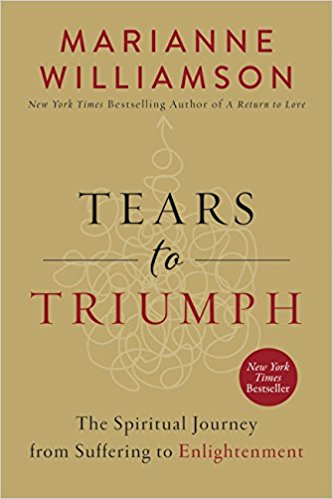 This book is a good read for anyone dealing with grief—be it from losing a loved one, a relationship, a social standing, or material possessions, or for anyone dealing with depression. In Tears to Triumph, Williamson, an internationally renown spiritual teacher and proponent of A Course in Miracles, delves deeply into our culture’s desire to avoid pain at all costs, as evidenced by today’s epidemic prescription of anti-depressants. Williamson argues that our current inability to deal with pain and the gifts it offers us in the form of messages has disconnected us from our deepest emotions and prevents us from true healing and spiritual growth. If you’re open to a new (and healthier) perspective on grief and sadness and its role in our lives, this might be an interesting choice.
This book is a good read for anyone dealing with grief—be it from losing a loved one, a relationship, a social standing, or material possessions, or for anyone dealing with depression. In Tears to Triumph, Williamson, an internationally renown spiritual teacher and proponent of A Course in Miracles, delves deeply into our culture’s desire to avoid pain at all costs, as evidenced by today’s epidemic prescription of anti-depressants. Williamson argues that our current inability to deal with pain and the gifts it offers us in the form of messages has disconnected us from our deepest emotions and prevents us from true healing and spiritual growth. If you’re open to a new (and healthier) perspective on grief and sadness and its role in our lives, this might be an interesting choice.
Dying to be Me, by Anita Moorjani
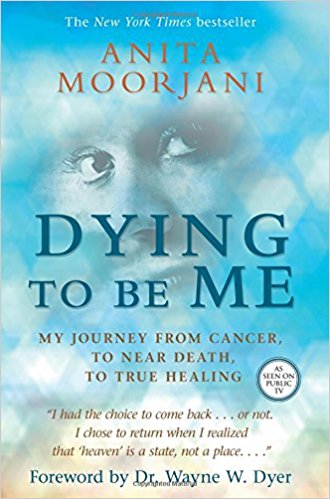 Anita Moorjani had stage 4 lymphoma, with tumors the size of lemons running from her neck down to her abdomen. On February 2, 2006, she went into a coma, and her family was told she would never come out. While in coma, Anita experienced her consciousness leaving her body. She could see her cancer-ravaged frame in the bed, hear the conversations between her doctors and her family, feel her brother’s anxiousness as he boarded a plane to travel to her hospital bed in Hong Kong. Her consciousness expanded to encompass everything. She felt a sense of wellbeing and unconditional love she had never before experienced on earth, and was given the option to cross over into the next realm, or go back into her body. After being shown the tapestry of her life’s purpose and knowing that she would recover completely if she chose to return, Anita chose to return. Now, 100% cancer-free, Anita travels the world speaking about her NDE and about the unconditional and total love that awaits all of us at the end of this life. I recommend this book to anyone interested in reading first person accounts of NDEs, as well as anyone curious about the possibilities waiting for us after physical death. If you enjoy this book, I also highly recommend Anita's second book, What If This is Heaven?
Anita Moorjani had stage 4 lymphoma, with tumors the size of lemons running from her neck down to her abdomen. On February 2, 2006, she went into a coma, and her family was told she would never come out. While in coma, Anita experienced her consciousness leaving her body. She could see her cancer-ravaged frame in the bed, hear the conversations between her doctors and her family, feel her brother’s anxiousness as he boarded a plane to travel to her hospital bed in Hong Kong. Her consciousness expanded to encompass everything. She felt a sense of wellbeing and unconditional love she had never before experienced on earth, and was given the option to cross over into the next realm, or go back into her body. After being shown the tapestry of her life’s purpose and knowing that she would recover completely if she chose to return, Anita chose to return. Now, 100% cancer-free, Anita travels the world speaking about her NDE and about the unconditional and total love that awaits all of us at the end of this life. I recommend this book to anyone interested in reading first person accounts of NDEs, as well as anyone curious about the possibilities waiting for us after physical death. If you enjoy this book, I also highly recommend Anita's second book, What If This is Heaven?
Proof of Heaven, by Eben Alexander, MD, Neurosurgeon
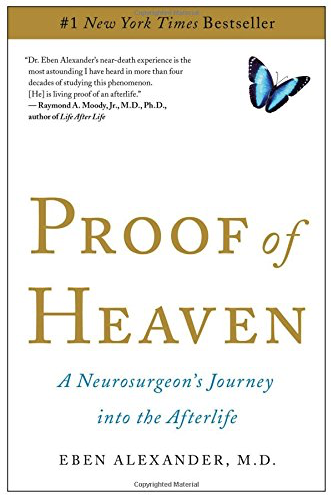 Dr. Eben Alexander was working as a neurosurgeon when he mysteriously contracted an extremely rare case of adult onset bacterial meningitis. For 7 days he remained in a coma at the mercy of brain-eating bacteria that threatened to kill him, or at best, render him a vegetable for the rest of his life. Proof of Heaven goes back and forth, between Dr. Alexander’s personal NDE experience while in coma, and the goings-on in his hospital room as his family and doctors tried to solve the mystery of his illness. Dr. Alexander’s personal story while in coma is riveting. He recounts phase by phase what he experienced while his consciousness lived outside of his body, and contrasts that with an outer experience that most readers can relate to if they’ve ever spent time in a hospital room worrying about a loved one. Post-recovery, Dr. Alexander delved into his medical files and attempted to scientifically explain his out of body experience. His book sheds light on several quantum physics theories that help explain why what happened to him was to him more real than his real life, and why consciousness might be much more than a byproduct of brain activity – an opinion he would have strongly denied before his NDE. This book is perfect for those who enjoy reading about NDEs as well as those who tend toward the scientific view of life and death.
Dr. Eben Alexander was working as a neurosurgeon when he mysteriously contracted an extremely rare case of adult onset bacterial meningitis. For 7 days he remained in a coma at the mercy of brain-eating bacteria that threatened to kill him, or at best, render him a vegetable for the rest of his life. Proof of Heaven goes back and forth, between Dr. Alexander’s personal NDE experience while in coma, and the goings-on in his hospital room as his family and doctors tried to solve the mystery of his illness. Dr. Alexander’s personal story while in coma is riveting. He recounts phase by phase what he experienced while his consciousness lived outside of his body, and contrasts that with an outer experience that most readers can relate to if they’ve ever spent time in a hospital room worrying about a loved one. Post-recovery, Dr. Alexander delved into his medical files and attempted to scientifically explain his out of body experience. His book sheds light on several quantum physics theories that help explain why what happened to him was to him more real than his real life, and why consciousness might be much more than a byproduct of brain activity – an opinion he would have strongly denied before his NDE. This book is perfect for those who enjoy reading about NDEs as well as those who tend toward the scientific view of life and death.
The Yoga of Eating, by Charles Eisenstein
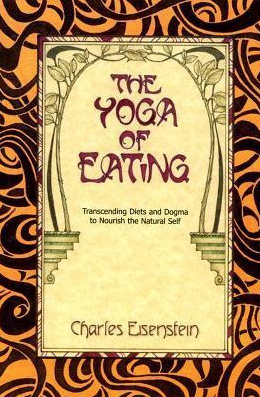 I consider The Yoga of Eating somewhat of an advanced book, not because the concepts are hard, but because they are exceptionally simple, and because they cross over from nutrition into spirituality. The Yoga of Eating questions the concept of willpower and why it doesn’t work (spoiler: because you’re fighting your true desires). It goes on to explore the connection between the physical (your body, your food) and the spiritual (your soul’s true desires and needs), and asks that you pay close attention to both when making food choices. Eisenstein says it best in his introduction: “The Yoga of Eating requires courage. To abandon the habits of distrust, restriction, and denial; to emerge from the shadow of willpower and trust that the body is a friend that speaks the truth; and to enact that truth even if it contradicts received beliefs about what is good and bad for you—this is no small step, but truly a leap of faith," (p6). If you’ve tried all kinds of diets and feel like you’re always fighting to lose weight, this book offers a broader, gentler, perspective from which we can view our relationship with food.
I consider The Yoga of Eating somewhat of an advanced book, not because the concepts are hard, but because they are exceptionally simple, and because they cross over from nutrition into spirituality. The Yoga of Eating questions the concept of willpower and why it doesn’t work (spoiler: because you’re fighting your true desires). It goes on to explore the connection between the physical (your body, your food) and the spiritual (your soul’s true desires and needs), and asks that you pay close attention to both when making food choices. Eisenstein says it best in his introduction: “The Yoga of Eating requires courage. To abandon the habits of distrust, restriction, and denial; to emerge from the shadow of willpower and trust that the body is a friend that speaks the truth; and to enact that truth even if it contradicts received beliefs about what is good and bad for you—this is no small step, but truly a leap of faith," (p6). If you’ve tried all kinds of diets and feel like you’re always fighting to lose weight, this book offers a broader, gentler, perspective from which we can view our relationship with food.
